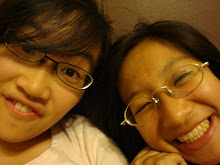When it comes to formal writing, "you" and "me" are often marked as the untouchables of the English language, right alongside "alot" and "dude." They have become the lepers of polite society, words that, in suggesting a direct and intimate connection with both the audience and the writer herself, endanger the tone of objectivity and professionalism academics and other smart people seek. People reading research papers or critical analysis want to be offered a view from the outside in, not a direct glimpse into the writer's heart. Or their own.
Of course, I'm not saying that third person and professionalism do not have their place. Limiting the use of words that speak of a more personal narrative certainly makes it more difficult for biased misconceptions to surface and distort critical analysis. Detachment, to a certain extent, is essential in academic work.
But how I've missed being able to poke the reader in the eye with a rousing "you," or sprinkling in a dash of personality with a handy first person pronoun! One of the reasons blogs are often much more entertaining to read is because they unabashedly flaunt their subjective and even biased content. These posts address their audiences with the familiarity of a particularly outspoken and slightly eccentric neighbor, and seem to hold nothing back. "There is nothing quite as degrading as trying to have a serious argument when you're half drunk and dressed up like a giant pumpkin of the tooth fairy" (Hyperbole and a Half) or "Yes, I packed wipes. I'M A MOTHER" (Dooce) are statements that, in their hilarious candour, click immediately with their reader's own thoughts and experiences. They are calls, reminders to examine the humanness of the words that surround them, and to seek some sort of connection. They say "yeah you, I'm talking to you" or "have you ever come across the same thing I have?" Where "one" is reserved, ever-courteous, and often hypothetical, "you" and "me" are rude, invasive, and unapologetic.
In reclaiming these two words, it feels as though I am somehow reclaiming my audience, and myself. No longer do I have to disguise the fact that I am reaching out to an audience (whether they are listening or not), or that my opinions and my interpretations are my own.
Oh you and me, how I've missed you.


No comments:
Post a Comment